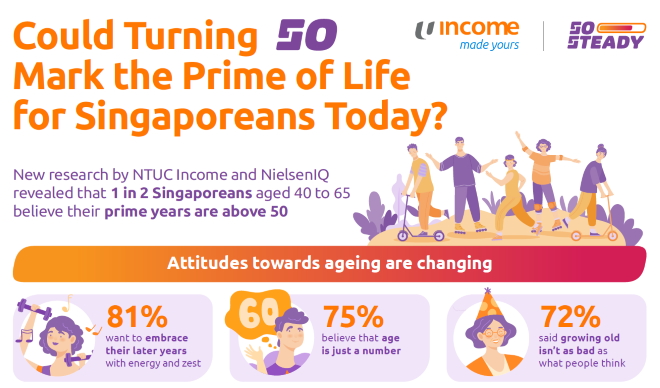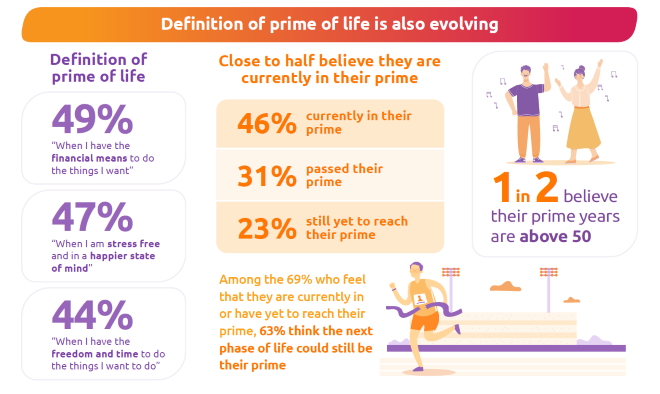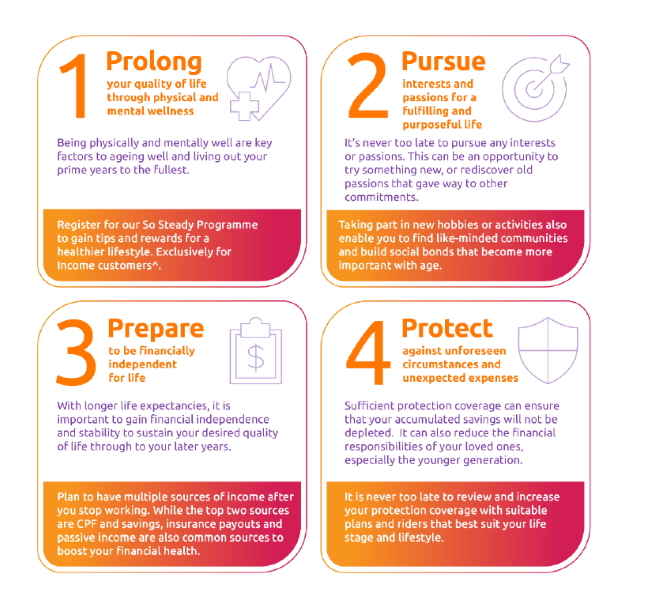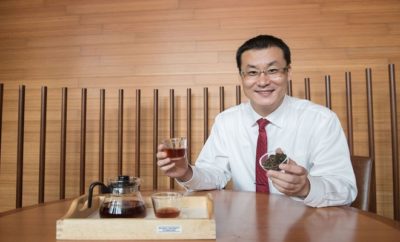
The Gen XY Lifestyle
Singaporeans are optimistic about ageing and see themselves at the prime of life after 50
Almost 1 in 2 Singaporeans aged 40 to 65 see themselves enjoying the prime of life after 50 and want to live their lives on their own terms.
A new study by NTUC Income (Income) and NielsenIQ revealed that Singaporeans aged 40 to 65 are optimistic about ageing. 76 percent of Singaporeans in this age group said that they do not feel old at all, 75 percent believed that age is just a number; and 72 percent felt that growing old is not as bad as what people think.
The “Redefining the Prime of Life” study was conducted online with 1,019 Singaporeans aged 40 to 65 with a per capita income of at least SGD 2,300. These insights can be viewed in context of Singapore being one of the most rapidly ageing societies in the world today, as well as having one of the world’s highest average life expectancy at 83.9 years. it seems that Singaporeans are living longer lives and their attitudes towards ageing are also shifting.
Age is but a social construct. With improvement in life expectancy, we now live longer, and it is important that we leverage these extended years. It’s encouraging to see that the study revealed a sense of optimism towards ageing amongst the 40 to 65 age group. I hope this translates to more embracing proactive lifestyles that will advance holistic well-being. It is important that we plan for successful ageing and take charge of our narrative.
Professor Paulin Straughan, Director of Singapore Management University’s Center for Research on Successful Ageing (ROSA)
Attitudes towards ageing, views about the present life situation and prime of life, as well as their level of preparedness and confidence in navigating their later years
76 percent of Singaporeans aged 40 to 65 saw their lives as being the same or better than before they turned 40. This sentiment was particularly evident among respondents who were married with kids (79 percent). 81 percent wanted to embrace their later years with energy and zest.
In contrast, singles (63 percent) were the least positive about their present life situation when compared to other respondents.
No association with the term senior
Respondents from the 50 to 65 age group also generally did not associate themselves with being ‘seniors’. From their perspective, this term was closely linked to their ‘older parents’, ‘retirement’, ‘dependent’ and ‘health issues’. Instead, they viewed terms such as ‘mature’, ‘prime age’, ‘active ageing’ and ‘warrior’ as more aligned to the way they saw themselves currently.
What does prime of life mean to the respondents?
The study also looked to identify and understand whether respondents felt there were in the prime of their life, and what this meant to them.
48 percent of respondents believed that their prime is after 50 years old. More specifically, close to half (46 percent) of the respondents believed that they are currently in their prime, while one-third (31 percent) of the respondents believed that they have passed their prime, and one-fifth (23 percent) believed that they have not attained prime of life.
The factors that contribute towards attaining ‘prime of life’ include finance-related, health, freedom, personal development, family and social-related factors.

Specifically, the findings revealed that to be in prime of life, Singaporeans, aged 40 to 65, want to live their lives on their own terms, with the top three contributing factors being:
- When I am having the financial means to do things that I want to do (49 percent)
- When I am stress-free and in a happier state of mind (47 percent)
- When I am having freedom and time to do things that I want to do (44 percent)
Amongst the 69 percent who said that they are currently in their prime or have yet to attain their prime, 63 percent believed that they could maintain or experience prime of life in the next phase of their life. These respondents shared their impressions of what this next phase of lives would look like:
- I can do the things that I want because I have more time and fewer responsibilities (75 percent)
- I have more freedom and control of my life to do what I like (74 percent)
- I have the experience, knowledge and financial means needed to achieve what I want (69 percent)
With the depth of insights from the study, we hope to raise awareness and spark action among Singaporeans to lead quality lives and to age successfully. To do so, we are introducing the 4Ps approach – Pursue, Prolong, Prepare and Protect – to help Singaporeans frame practical and sustainable actions to take in their pursuit to age well. We are also eager to continuously engage them on the narrative of seizing ‘prime of life’ after 50 via the ‘So Steady’ programme, which will include curated initiatives4 for Income customers and members of the public.
Marcus Chew, Chief Marketing Officer, Income

Not my parent’s generation
The study revealed a stark contrast between the attitudes of the respondents and that of their parents’ generation in navigating life.
85 percent felt that they face greater uncertainties and disruptions in a fast and ever-changing environment compared to their parents’ generation. Despite a more challenging environment, respondents (88 percent) cited that they do not want to be a financial or physical burden to their children in their later years.
In comparison with their parents’ generation, 82 percent of respondents cited having more resources and options to plan. 77 percent believed that they have more freedom to deviate from traditional notions of success unlike their parents’ generation, who typically adhered to fixed or traditional success models. 78 percent believed that they are more financially savvy to plan for their next phase of life confidently as compared to their parents.
With each generation, we face different challenges as normative expectations shift. In particular, our population demographics reveal that more Singaporeans are remaining single. The study suggests that single respondents had greater concerns with health and finances disrupting their plans for retirement, perhaps because they have to prepare for successful ageing on their own. How do we evolve services that might partner our singles as they navigate through these challenges?
Professor Paulin Straughan, Director of Singapore Management University’s Center for Research on Successful Ageing (ROSA)
Getting Ready for the Next Phase of Life
When asked about the factors that are most important to them in their next phase of life, 89 percent cited physical and mental health, while 61 percent highlighted social bonds and connections with family and friends and 54 percent said it is their wealth and possessions.
Contrasting with the actions that respondents are taking to prepare for their next phase of life, financial preparedness emerged as the top priority, followed by keeping themselves healthy.
- 78 percent said they are saving up as much as possible while working
- 74 percent is practicing prudence in spending
- 72 percent are keeping mentally engaged
- 70 percent are maintaining a healthy diet
- 65 percent are exercising
- 65 percent are buying insurance

This article was edited and republished from our partner Family of Fathers with permission. The original article can be found at this link.









